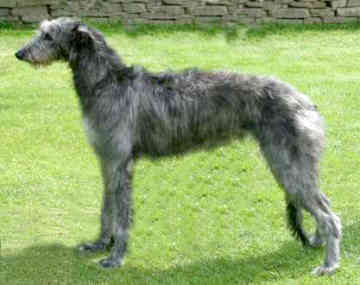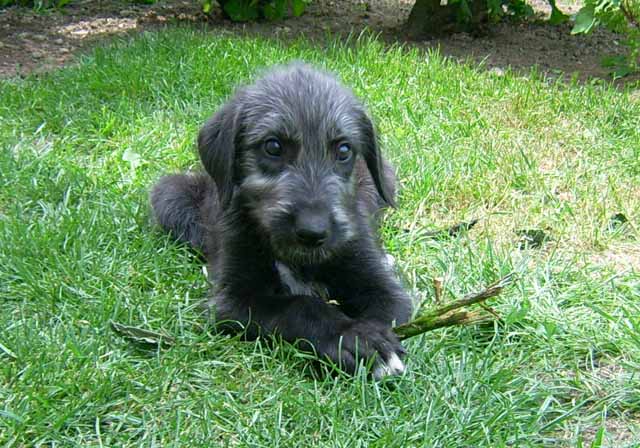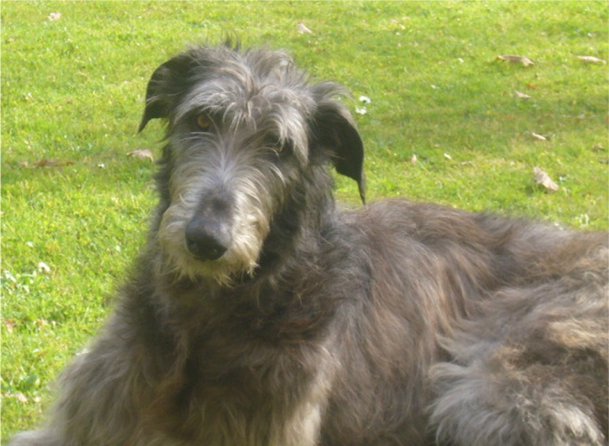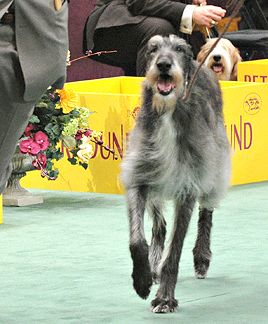| |
|
|
Scottish Deerhound Information

Scottish Deerhound Facts
| Size |
Large |
| Male Max Weight |
85-110 lb |
| Female Max Weight |
75-95 lb |
| Life Span |
7-9 years |
| Energy Level |
 |
| Ease of Training |
 |
| Grooming |
 |
| Shedding |

|
| Exercise Requirements |

|
| Playfulness |

|
| Affection Level |

|
| Good With Dogs |

|
| Good With Pets |

|
| Good With Strangers |

|
| Watchdog Ability |

|
| Protection Ability |

|
| Cold Tolerance |

|
| Heat Tolerance |

|
Scottish Deerhound Temperament
|
The Scottish Deerhound is a very laid-back, relaxed, and calm
breed of dog. It is an extremely courteous and well-behaved dog, making it a perfect fit
for the home. When it is outside, the Scottish Deerhound loves to sprint and go after
anything that budges. However, when it is inside, this breed of dog is very peaceful and
needs an ample amount of space to stretch out on a comfortable surface. As a hound dog,
the Scottish Deerhound is very independent. However, towards its owner, this dog aims to
please. The Scottish Deerhound is particularly sensitive. Around strangers, this breed of
dog is friendly but also somewhat shy overall. It is good with children, other dogs, and
for the most part other types of pets. However, it may be somewhat curious of strange
animals.
|
Scottish Deerhound Upkeep
|
Coming from the hound family, the Scottish Deerhound needs a
decent amount of exercise every day. This exercise can be in the form of a simple long
walk or allowing it to run around in a secure area. While physically created to feel
natural in outdoor living situations and climates, the Scottish Deerhound much prefers to
live inside the house with its family. This dog needs human companionship and
compassionate love. In order to avoid calluses, it needs gentle and soft bedding. Because
the Scottish Deerhound has such a crisp coat of fur, it needs combed at least once or
twice a week. Along with combing, this breed of dog could use some fur trimming to keep
its coat straightened nicely.
|
Scottish Deerhound Health
|
The Scottish Deerhound has a life span of seven to nine years.
Some of the major health concerns associated with the Scottish Deerhound are: gastric
torsion, cardiomyopathy, and osteosarcoma. Some of the more minor health concerns that
this breed has are: cystinuria, and atopy, or better known as allergies. Hypothyroidism
and neck pain are occasionally seen in the Scottish Deerhound. To help control these
health concerns, it is suggested to take cardiac and cystinuria tests. However, it is to
be noted that this breed is sensitive to barbiturate
anesthesia.
|
Scottish Deerhound History
|
The Scottish Deerhound is one of the most noble of breeds. Since
at least the sixteenth century, it has been appreciated for its skill in chasing down
deer. It is somewhat difficult to research the specific history regarding the Scottish
Deerhound due to its confusion in names. However, it can safely be assumed that it is a
very ancient breed, stemming from ancestral Greyhound roots. Similar to its soft-coated
Greyhound relatives, the coarse-coated Scottish Deerhound was not allowed to be owned by
anyone ranked below the status of an Earl during the Age of Chivalry. However, as the
Stag population lowered in England, the bigger, coarse-coated dogs suited for hunting
stag became concentrated to the specific area that the stag remained plentiful, mainly in
the Scottish Highlands. Here, the Scottish Deerhound were cherished and gathered by
Highland chieftains. This hoarding caused the decline of this breed in the mid 1700s
following the collapse of the clan system of Culloden. Once breech-loading rifles came
into play, the decline of the breed grew larger. However, by the mid 1800s, there was a
successful effort to re-establish the breed. After this point, the first Deerhound club
was created in England and the first Deerhounds were displayed in dog shows. However, the
First World War caused a decline in the breed once again and since the Scottish Deerhound
has remained sparse, yet a classic and high quality
breed.
|
Scottish Deerhound Pictures
|
Puppies

Middle Aged

Older

|
Scottish Deerhound Videos
|
|
|







